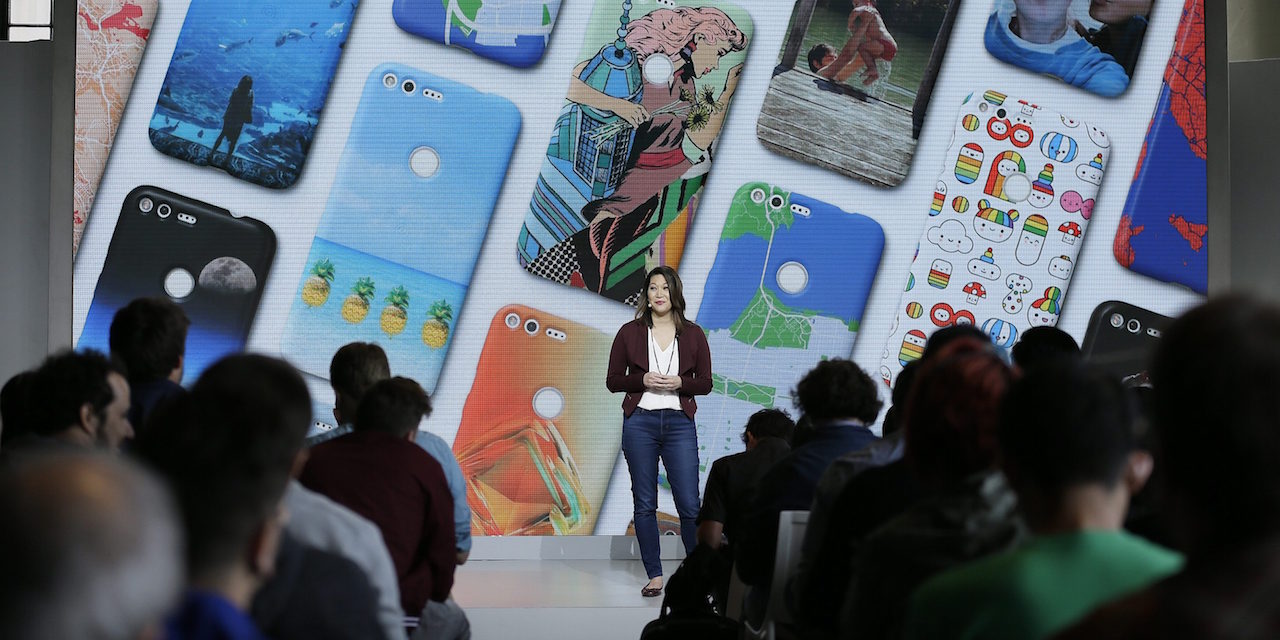Google launched an aggressive challenge to consumer electronics giants like Apple and Samsung on Tuesday, introducing a new line of smartphones called Pixel and other gadgets designed to showcase a digital helper the company calls “Google Assistant.”
The new devices represent a big push by Google to make and sell its own hardware, instead of largely just supplying software for other manufacturers. At a starting price of roughly $650, the new Pixel phones are aimed at the same markets as Apple’s iPhone and Samsung’s Galaxy flagship phones.
During a press event Tuesday, Google executives showed off a series of gadgets in rapid succession. Its new Home device is a sleek internet-connected speaker that’s designed to respond to voice commands, like Amazon’s popular Echo. A new virtual reality headset called Daydream View will work with the new Pixel phones and other Android devices. Also unveiled were a new Wi-Fi router and an update to the company’s Chromecast streaming media device.
In announcing the new Pixel phones, Google executives touted features like a powerful camera, a long-lasting battery — and a dedicated headphone jack, which Apple recently eliminated from its latest iPhones. The Pixel phones will be sold in two screen sizes — 5 inches and 5.5 inches — and three colours: black, silver and blue.
But they’re clearly hoping that the new Pixel phones will be distinguished by their use of Google’s software. A central element of all the new devices is the Google Assistant, which uses artificial intelligence to deliver what CEO Sundar Pichai described as “a personal Google for each and every user.”
Google, which is best known for its widely used internet search engine, makes most of its money from online software and digital ads. But it’s putting more emphasis on hardware as it competes for consumers’ attention with other leading tech firms.
HARDWARE IS HARD
New devices could help Google keep its services front and centre in the battle for consumers’ attention, said analyst Julie Ask at Forrester Research. Unlike a new mobile app or other software, she noted, it can be an expensive gamble to build and ship new hardware products. “But if you’re Google, you can’t afford to stop placing bets.”
Google has sold smartphones and tablets under the Nexus brand, which it launched in 2010 as a way to show off the best features of its Android software. But it put relatively little effort into promoting those devices, which have mostly ended up in the hands of Google purists.
Android already powers the majority of smartphones sold around the world. But Samsung, the biggest maker of Android phones, has increasingly been adding more of its own software — even its own Samsung Pay mobile wallet — on the phones it sells. Another big rival, Apple, has built its own services, such as online maps and its own Siri personal assistant, to replace Google’s apps on the iPhone.
Google will sell its Pixel phones online, through retail chains like Best Buy and various wireless carriers around the world, although the company said it has an exclusive deal with Verizon in the United States.
HOME, BUT NOT ALONE
Like the Pixel phones, the “Home” device uses Google’s digital “Assistant” service, a voice-activated personal butler that can search the internet, play music or perform other useful tasks. “Assistant” is the company’s answer to similar concierge services from rivals, including Siri, Amazon’s Alexa and Microsoft’s Cortana.
Google said the Home device will sell for roughly $130 online and at electronics retailers starting next month.
Leading tech companies are all competing to assist consumers in their online activities, from search and navigation to shopping. That gives the companies a better chance of selling advertising or other services.
Home-based systems like the Echo are taking on more importance as voice technology has improved, said Forrester’s Ask. “You can’t assume somebody is going to go sit down at a computer or pick up a phone and type in a question anymore,” she said.












